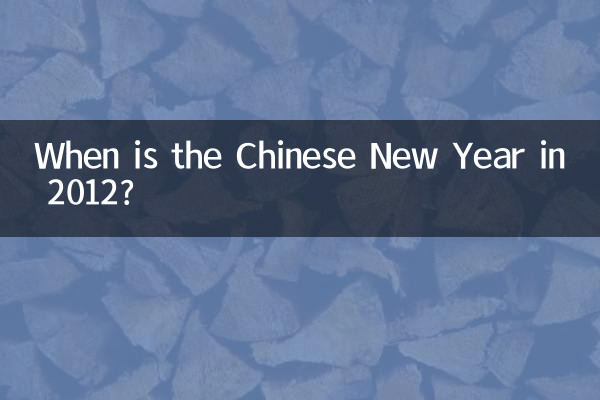When is the Chinese New Year in 2012?
As the Spring Festival approaches, many people begin to pay attention to the specific date of the Spring Festival in 2012. The Spring Festival is the most important traditional festival in China, and its date varies each year according to the lunar calendar. This article will give you a detailed introduction to the specific time of the Spring Festival in 2012, and present you with a structured content based on the hot topics on the Internet in the past 10 days.
2012 Spring Festival date

The Spring Festival of 2012 isJanuary 23, the first day of the first lunar month. The following is the holiday schedule before and after the Spring Festival in 2012:
| Date | week | Holidays/Holidays |
|---|---|---|
| January 22 | Sunday | New Year's Eve |
| January 23 | Monday | Spring Festival (first day of the first lunar month) |
| January 24 | tuesday | The second day of the first lunar month |
| January 25 | wednesday | The third day of the first lunar month |
| January 26 | Thursday | The fourth day of the first lunar month |
| January 27 | Friday | The fifth day of the first lunar month |
| January 28 | Saturday | The sixth day of the first lunar month |
Popular topics on the Internet in the past 10 days
The following are the hot topics and content that have attracted attention across the Internet in the past 10 days, with discussions related to the Spring Festival being particularly prominent:
| hot topics | heat index | Main discussion content |
|---|---|---|
| The wave of returning home during the Spring Festival | ★★★★★ | Traffic pressure and difficulty in purchasing tickets during Spring Festival travel period |
| Spring Festival movies | ★★★★☆ | 2012 Spring Festival movie recommendations and box office forecasts |
| New Year's Eve dinner reservation | ★★★★☆ | New Year’s Eve dinner packages and reservations at major restaurants |
| Spring Festival travel | ★★★☆☆ | Popular tourist destinations and Spring Festival travel guide |
| Spring Festival customs | ★★★☆☆ | Traditional customs and cultural differences during the Spring Festival in various places |
Spring Festival Customs and Culture
The Spring Festival is an important part of Chinese traditional culture, and different regions have different ways of celebrating it. The following are common Spring Festival customs:
| custom | area | Specific content |
|---|---|---|
| Paste Spring Festival couplets | Nationwide | Couplets posted on the door mean good luck |
| Set off firecrackers | north | Exorcise evil spirits and avoid disasters, and welcome the New Year |
| dragon dance and lion dance | South | Lively and festive, pray for good luck |
| eat dumplings | north | Symbolizes reunion and wealth |
| Send red envelopes | Nationwide | The elders give lucky money to the younger ones, which means peace |
What’s special about the 2012 Spring Festival
There are some special things about the 2012 Spring Festival:
1.Leap year impact: 2012 is a leap year, February has 29 days, but the Spring Festival is in January, so the holiday arrangement is slightly different from previous years.
2.weather conditions: During the 2012 Spring Festival, the temperature in the northern region is low, and some areas in the south experience rain and snow. People returning home need to pay attention to travel safety.
3.cultural activities: During the 2012 Spring Festival, a variety of cultural activities were held in various places, such as temple fairs, lantern festivals, etc., attracting a large number of tourists.
Summary
The Spring Festival in 2012 is on January 23, the first day of the first lunar month. As the most important traditional festival in China, the Spring Festival is not only a time for family reunion, but also a carrier of cultural inheritance. Through the structured data in this article, you can clearly understand the date of the 2012 Spring Festival, holiday arrangements, and related hot topics and customs. I hope this information can help you better plan your Spring Festival holiday and enjoy the festive atmosphere.

check the details

check the details